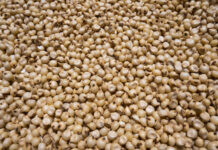
Alcoholic beverages will not contain nutritional information on its labels except the energy content in kilocalories, the Food Safety Standard Authority of India (FSSAI) has said. In a new notification issued on 21 August, FSSAI said the declaration related to energy content will also be voluntary.
The notification was part of an amendments to the existing regulations that governing alcoholic beverages to ensure food safety and quality standards. The Food Safety and Standards (Alcoholic Beverages) First Amendment Regulations, 2023 will come into force on 1 March 2024.
In other changes, the regulatory body has made changes to the definition of single-malt whiskey and single-grain whiskey. Single-malt whisky has been described as a distillate obtained from fermented mash that uses malted barley without adding any other grain, which is “distilled in pot still only and produced in a single distillery”.
Single-grain whiskey has been defined as a distillate obtained from a fermented mash that uses malted or unmalted grain and produced in a single distillery. Single grain whiskey will not include single malt whiskey and blended malt whiskey or blended grain whiskey, the order signed by G Kamala Vardhana Rao, chief executive officer, said.
The amendments follow the draft of the Food Safety and Standards (Alcoholic Beverages) Amendment Regulations, 2022. The previous draft was made for the public to share their objections and suggestions within a 60-day window from the date of publication.
The transition period to 1 March 2024 will allow manufacturers, distributors, and retailers to adapt to the new labeling requirements and definitions.
Low-alcohol beverages and country liquor
In an earlier notification, FSSAI had created a category of ‘ready-to-drink’ or low-alcohol beverages, having an alcohol content of 0.5-8%, media reports said.
The gazette notification said such low alcoholic beverages would be made from spirits, a mixture of spirits, or any alcoholic beverage other than wine and beer as base. They can have natural, nature-identical or artificial flavors, and/or food additives permitted under the regulations concerned. Mixing can be with fruit or vegetable juice with or without added sugar/salt and with or without carbonation.
In the same notification, FSSAI described “country liquor” or “Indian liquor” and their constituents. It said country liquor or Indian liquor are alcoholic beverages obtained from distilling fermentable carbohydrates of agricultural origin such as fermented molasses, jaggery (gur), a mash of cereals, potatoes, cassava, fruits, juice or sap of coconut and palm trees, mahua flowers, etc.
IndiFoodBev — authentic, impactful and influential
An English-language food and beverage processing and packaging industry B2B platform in print and web, IndiFoodBev is in its third year of publication. It is said that the Indian food and beverage industries represent approximately US$ 900 billion in revenues which implies more than 20% of the country’s GDP. Eliminating the wastage on the farmside can help to deliver more protein to a higher number of the population apart from generating sizable exports. The savings in soil, seeds, water, fertilizer, energy and ultimately food and nutrition could be the most immense contribution that country is poised to make to the moderation of climate change.
To improve your marketing and grow sales to the food and beverage processing and packaging industry, talk to us. Our research and consulting company IppStar [www.ippstar.org] can assess your potential and addressable markets in light of the competition. We can discuss marketing, communication, and sales strategies for market entry and growth.
Suppliers and service providers with a strategy and budget for targeted marketing can discuss using our hybrid print, web, video, and social media channels to create brand recognition linked to market relevance. Our technical writers are ready to meet you and your customers for content.
The second largest producer of fruit and vegetables in the world is continuously expanding processing capacities and delivery systems with appropriate innovative technologies. We cover product and consumer trends, nutrition, processing, research, equipment and packaging from farm to thali. Get our 2025 media kit and recalibrate your role in this dynamic market. Enhance your visibility and relevance to existing markets and turn potential customers into conversations. Ask for a sample copy of our bi-monthly in print or our weekly IndiFoodBev eZine each Wednesday.
For editorial info@ippgroup.in — for advertisement ads1@ippgroup.in and for subscriptions subscription@ippgroup.in
Naresh Khanna – 10 February 2025
Subscribe Now










